If you’re planning a move to Canada, chances are you’ve already considered which cities you’d like to live in. Across the country, Canada’s individual provinces & territories offer a completely different experience from one another, with their own regional differences, climate, and greatly varying prices for things like transportation, groceries, dining, and of course – rent. In this cost of living comparison, liv.rent will be looking at six major Canadian cities side-by-side: Vancouver, Toronto, Montreal, Calgary, Edmonton, and Ottawa, to give renters a better idea of what they can expect to spend each month.
Rent your perfect home with liv.rent
Search houses, rooms, condos and apartments for rent. Chat instantly with verified landlords. Apply to multiple listings. Save your chat history & signed documents all on one platform.
Get Up To $4,100 Cash Back** With A New BMO Mortgage. Plus, Lock In Your Rate For 130 Days!* Offer Ends November 4, 2024.
Cost of living comparison: Canada’s major cities
How much you can expect to spend on recurring expenses and essential items varies greatly by province and city. Along with an array of vastly different rent prices in each market, the costs of goods and services will also depend on where you’re living.
In order to help renters better prepare for life in whichever Canadian city they choose, we’ve created this cost of living comparison to break down the average prices for essential and non-essential items in each area.
Basics, bills & utilities
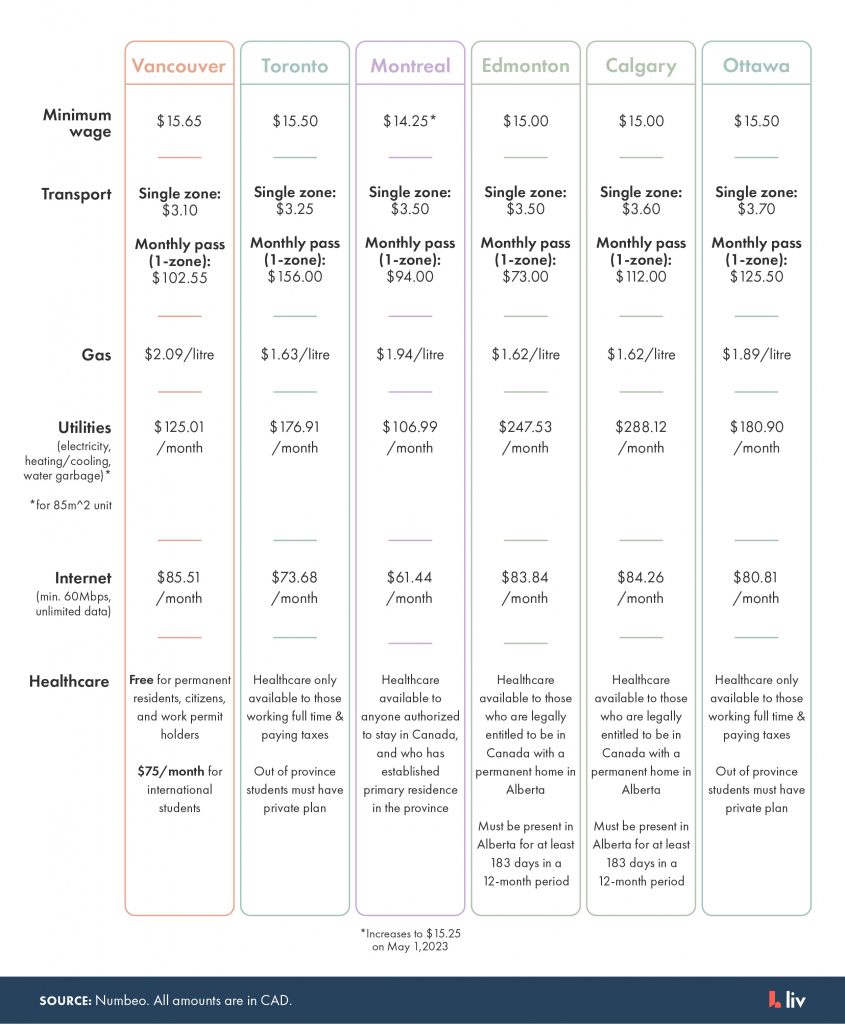
Other spending
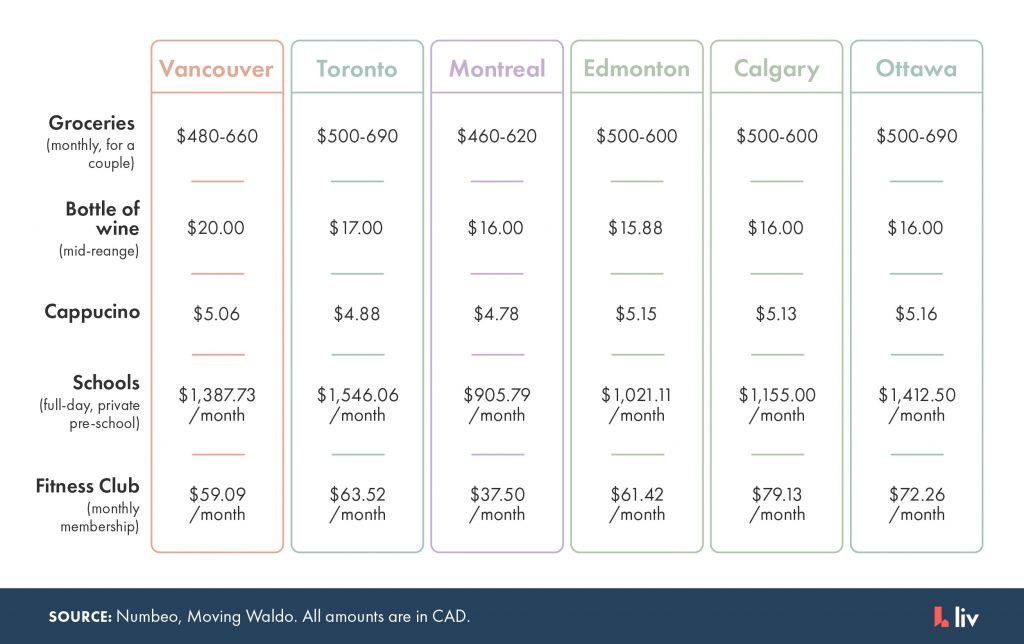
Average rent in Canada’s major cities
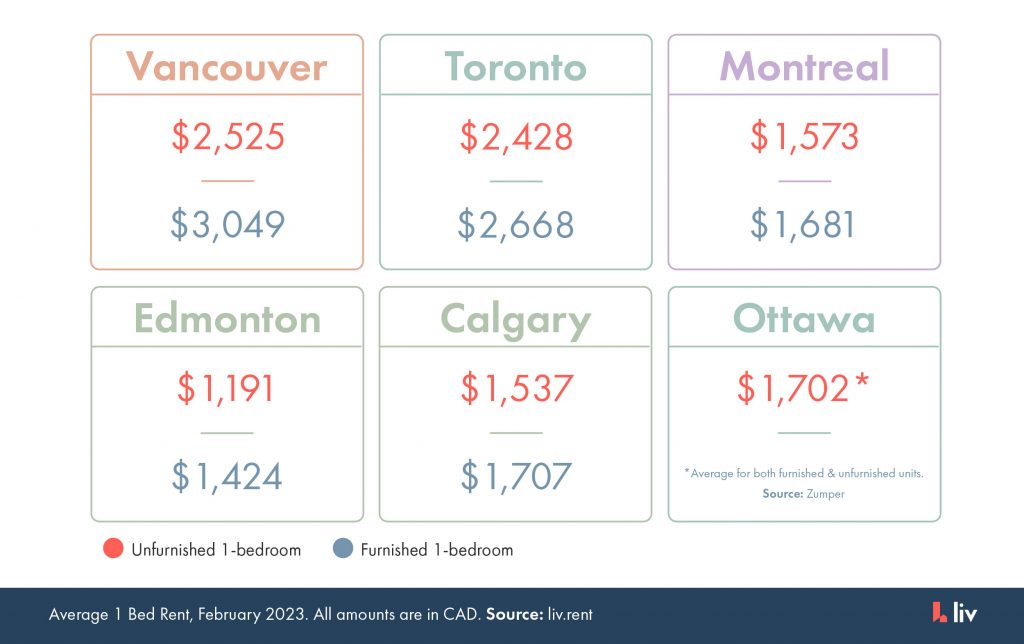
Differences between Canada’s major cities
Canada is a vast country, spanning from coast to coast with ten distinct provinces and three territories that each have their own unique way of life. For newcomers to the country, deciding where you’ll call home is usually a matter of which school you plan on attending, which city offers the best employment opportunities, or where you have family or friends.
Whether you’ve already decided where you’ll be living or you’re already a renter or landlord in Canada considering a move, here’s a quick summary of each of the six Canadian cities we’ll be comparing today:
Vancouver
Vancouver is located in the province of British Columbia on Canada’s West Coast. Perhaps best known for its frequent rain, mild temperatures, and proximity to nature, there’s much more to Vancouver than meets the eye.
A sprawling and diverse metropolitan area has all manner of shopping and dining destinations, with the region’s many beaches, lakes, rivers, mountains and trails never far from reach. For job-seekers, Vancouver has a thriving film industry and is a destination for many tech companies, as well as being home to two world-class universities in The University of British Columbia and Simon Fraser University.
Listings for rent in Vancouver
- Studio apartments for rent: Vancouver
- One-bedroom units for rent: Vancouver
- Two-bedroom units for rent: Vancouver
Key statistics
Population: ~675,000 (2017)
Crime rate: 40.97 (Moderate)
Traffic Index: 147.74
Healthcare Index: 73.69
Source: Numbeo
Weather
Vancouver is known across the country for its mild temperatures, and even milder winters – especially when compared to other parts of Canada. Even in the depths of December, Vancouver averages a high of 7°C and a low of 3°C. The only caveat is that Vancouver is notorious for its rain. Looking again at December, Vancouver averaged 15 days of rain during the month.
Education
Vancouver is home to a variety of post-secondary institutions, offering students a range of options for furthering their education. Some of the most notable schools in the area include the University of British Columbia, Simon Fraser University, Langara College, and Vancouver Community College.
These institutions offer programs in a number of fields, including arts, sciences, business, engineering, and technology. With their diverse offerings and world-class facilities, these schools are a major draw for both local and international students seeking a top-notch education in one of Canada’s most vibrant and dynamic cities.
Employment
Vancouver enjoys a strong and diverse economy built largely around its technology, film, and tourism industries. The range of employment opportunities makes it a popular destination for job-seekers of all backgrounds, with plenty of job openings for all levels of experience. Vancouver’s status as a popular tourist destination means lots of jobs in the hospitality and tourism sectors, and the city also has one of Canada’s fastest-growing tech industries. Looking strictly at the numbers, Vancouver’s unemployment rate stood at 4.6% as of December 2022.
Toronto
Toronto has long been Canada’s business and financial capital and is home to the headquarters of many multinational corporations as well as the majority of Canada’s banking and finance industry. Much larger in size and with convenient access to cities like New York and Boston, not to mention some truly gorgeous scenery of its own, Toronto is a desirable location for residents looking for a true urban experience.
Listings for rent in Toronto
- Studio apartments for rent: Toronto
- One-bedroom units for rent: Toronto
- Two-bedroom units for rent: Toronto
Key statistics
Population: 2.93 million (2017)
Crime rate: 46.62 (Moderate)
Traffic Index: 200.88
Healthcare Index: 75.40
Source: Numbeo
Weather
Toronto is a true Canadian city, especially in terms of its weather. During the month of December, Toronto’s highs average 3°C while its lows sit around -3°C, with temperatures frequently dipping below -10°C during the coldest times of the year. Also during December, Toronto averaged 10 days of snow and 7 days of rain. The summer months were much warmer in Toronto, however, with average highs of 27°C and lows of 18°C for the month of July, and approximately 7 days of rain for the month.
Education
Toronto is home to one of the country’s top universities in The University of Toronto, which welcomes approximately 62,000 students each year. In addition to this, Toronto has a good assortment of top schools like York University, Ryerson University, Humber College and OCAD which all attract plenty of students from across the country and internationally.
Employment
Toronto is typically viewed as Canada’s financial and business capital thanks to its proximity to major East Coast financial centres and abundance of corporate opportunities. The city is home to multiple multinational headquarters as well as a booming banking industry. Looking at the data, Toronto’s unemployment rate was 6.0% as of December 2022.
Montreal
Montreal is the capital city of Québec, Canada’s French-speaking province and its second-most populous only to Toronto. Montreal is a cultural hub with a distinct charm owing to its rich history and gorgeous scenery along the canals. The city is a blend of old and new, with modern skyscrapers standing alongside historic buildings, such as the Basilica of Notre-Dame and the Old Port of Montreal. It is also a hub for the arts, with numerous theatres, museums, and festivals that attract visitors from around the world. In addition, Montreal is famous for its food, with a diverse range of cuisines and a thriving cafe culture.
Listings for rent in Montreal
- Studio apartments for rent: Montreal
- One-bedroom units for rent: Montreal
- Two-bedroom units for rent: Montreal
Key statistics
Population: 1.78 million (2017)
Crime rate: 29.60 (Low)
Traffic Index: 166.80
Healthcare Index: 63.23
Source: Numbeo
Weather
Montreal has a similar climate to other Central Canadian cities like Toronto. Winters are predictably cold, with average highs of -1°C and lows of -8°C. On average, there are 13 days of rainfall each December and 12 days of snowfall. Summers are much more pleasant, however, with average highs of 26°C and lows of 18°C in July.
Education
Montreal has the highest proportion of post-secondary schools among all major North American cities, and has six universities within an 8km radius. The most prominent among these is McGill University, but there are plenty of other options too – like Dawson College, Vanier College, and College LaSalle.
Employment
Montreal’s diverse job market has plenty to offer renters seeking a fulfilling career. Montreal has long been home to one of Canada’s largest ports, and is also a hub for the country’s railways. More recently, Montreal has developed a reputation as a growing leader in the tech industry – particularly in the fields of video games and AI development. Montreal is also home to a thriving arts & culture scene with plenty of employment opportunities surrounding television and music production and the many music, film, culture, and comedy festivals that take place within the city.
Calgary
Calgary is the largest city in Alberta and has the largest metropolitan area out of the prairie provinces. The city is known for its robust economy, largely driven by the oil and gas industry, as well as its strong cultural scene and outdoor recreational opportunities. With its close proximity to the Rocky Mountains, residents and visitors can enjoy a variety of winter sports, as well as hiking and camping in the summer months. Calgary is also home to several iconic attractions, such as the Calgary Stampede, a world-famous rodeo and festival, and the Calgary Tower, offering breathtaking views of the city. Overall, Calgary is a dynamic and vibrant city with a high quality of life and a rich cultural heritage.
Listings for rent in Calgary
- Studio apartments for rent: Calgary
- One-bedroom units for rent: Calgary
- Two-bedroom units for rent: Calgary
Key statistics
Population: 1.36 million (2017)
Crime rate: 38,61 (Low)
Traffic Index: 131.16
Healthcare Index: 74.59
Source: Numbeo
Weather
Like much of continental Canada, Calgary’s climate is characterized by long, cold winters and warm summers. In December, the average temperature is around -7°C, with occasional snowfall and cold winds. In contrast, July is the warmest month with an average temperature of 17°C and sunny, comfortable weather.
Education
Calgary is home to several notable post-secondary institutions, offering a wide range of programs and disciplines. The University of Calgary is a leading research-intensive university and one of Canada’s top institutions, while the Southern Alberta Institute of Technology (SAIT) is a polytechnic institute known for its hands-on, applied education. Additionally, Mount Royal University is a mid-sized university with a strong focus on student experience and career readiness.
Employment
Calgary has a strong and diverse economy, providing ample employment opportunities across a range of industries. The energy sector, particularly oil and gas, is a significant contributor to the local economy, and there are also thriving industries in finance, technology, and manufacturing. The city has a low unemployment rate and a growing job market, making it an attractive location for job seekers and businesses alike.
Edmonton
Edmonton is a vibrant and dynamic city located in Alberta, Canada. It is the capital of the province and is known for its rich history and cultural scene, as well as its thriving economy. The city is home to many landmarks that reflect its past, including Fort Edmonton Park, which is a re-creation of the city’s original settlement. Edmonton is also a hub of commerce and industry, with a diverse economy that includes sectors such as energy, technology, and healthcare. The city has a growing population and is considered a hub of innovation and progress in Western Canada.
Listings for rent in Edmonton
- Studio apartments for rent: Edmonton
- One-bedroom units for rent: Edmonton
- Two-bedroom units for rent: Edmonton
Key statistics
Population: 981,000 (2017)
Crime rate: 53.00 (Moderate)
Traffic Index: 122.48
Healthcare Index: 77.69
Source: Numbeo
Weather
Much like Calgary, Edmonton has a continental climate with long, cold winters and warm summers. In December, the average high temperature is around -7°C, while the average low temperature is around -15°C. In July, the average high temperature is around 21°C, with an average low temperature of around 9°C.
Education
Edmonton offers a variety of post-secondary education options for students. The city is home to several universities, including the University of Alberta, which is one of Canada’s top research institutions. It offers a wide range of programs in areas such as business, engineering, medicine, and the arts. Additionally, Edmonton is home to several colleges and technical institutes, including NorQuest College and MacEwan University, which offer programs in fields such as health sciences, trade and technology, and the creative arts.
Employment
The energy sector is a major contributor to Edmonton’s economy, with many companies involved in the exploration, production, and distribution of oil and gas. The technology sector is also growing in Edmonton, with a number of companies specializing in areas such as software development, cybersecurity, and data analytics. The healthcare industry is also an important contributor to the local economy, with many institutions providing jobs in fields such as nursing, medicine, and medical research. The retail sector is another significant contributor to the local job market, with opportunities for sales and customer service professionals, as well as jobs in areas such as marketing and logistics.
Ottawa
Ottawa is the capital city of Canada, located in Southwest Ontario. In addition to housing the nation’s government, Ottawa offers a rich history, stunning architecture, and a thriving arts and culture scene. With a growing population and a strong economy, Ottawa is considered one of the most livable cities in Canada, offering a high standard of living, excellent educational opportunities, and a wide range of recreational and cultural activities. Whether you’re interested in history, politics, or just a great place to live and work, Ottawa has something to offer everyone.
Listings for rent in Ottawa
- Studio apartments for rent: Ottawa
- One-bedroom units for rent: Ottawa
- Two-bedroom units for rent: Ottawa
Key statistics
Population: 995,000 (2017)
Crime rate: 27.35 (Low)
Traffic: 126.12
Healthcare: 71.71
Source: Numbeo
Weather
Ottawa experiences a fairly long winter season, typically lasting from November to April. In December, the average temperature is around -7°C, with lows of around -14°C and highs reaching about -2°C. On the other hand, in July the average low temperature is typically around 13°C with highs reaching around 26°C.
Education
Ottawa is home to a number of prestigious post-secondary educational institutions, offering a wide range of programs and opportunities for students at all levels. The city is home to the University of Ottawa, one of Canada’s largest and most comprehensive universities, offering programs in a wide range of fields including arts, sciences, engineering, medicine, law, and business. Carleton University is another major university located in Ottawa, known for its programs in areas such as public affairs, journalism, and technology. There are also a number of colleges and technical institutes in the city, offering certificate, diploma, and degree programs in fields such as healthcare, information technology, and trades.
Employment
Ottawa is a major economic hub in Canada, with a thriving job market and a strong demand for skilled workers in a variety of industries. The city is home to many federal government departments and agencies, providing a large number of public sector jobs in fields such as administration, policy, and research. The technology sector is also a significant contributor to the local economy, with many companies specializing in areas such as software development, cybersecurity, and telecommunications.

Rethink The Way You Rent
Not on liv.rent yet? Experience the ease of digital applications & contracts, verified tenants & landlords, virtual tours and more – all on one platform. Sign up for free or download the app.
Subscribe to receive the latest tenant & landlord tips and get notified about changes in the Canadian rental market.
>> Stay up-to-date on the average rent in Vancouver, Toronto and Montreal: Rent Reports.


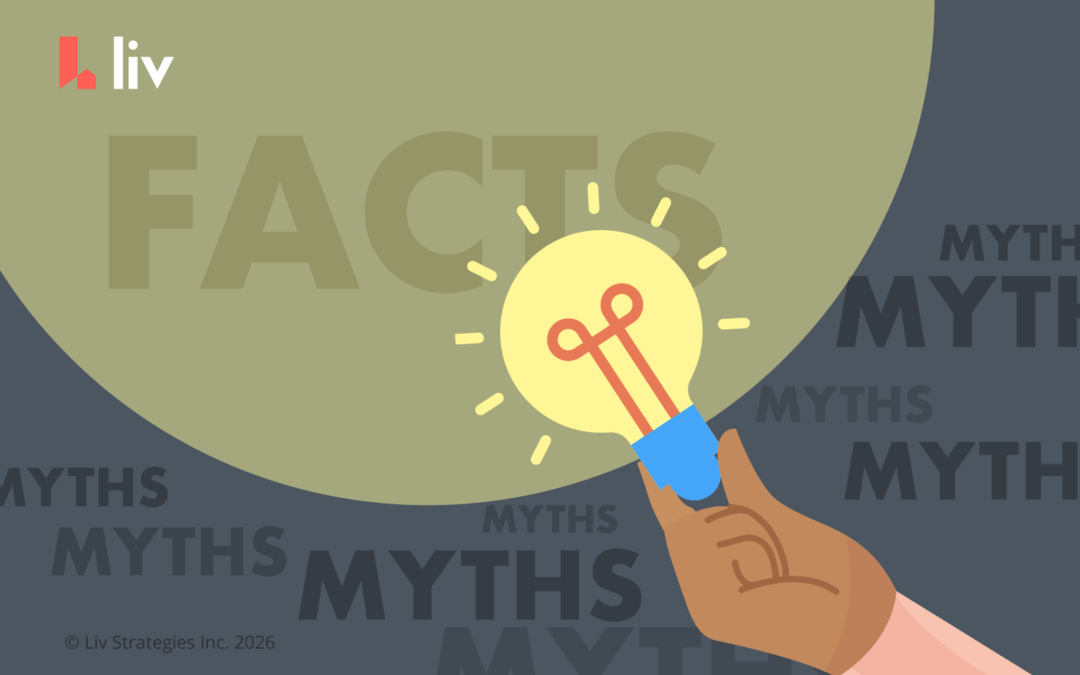
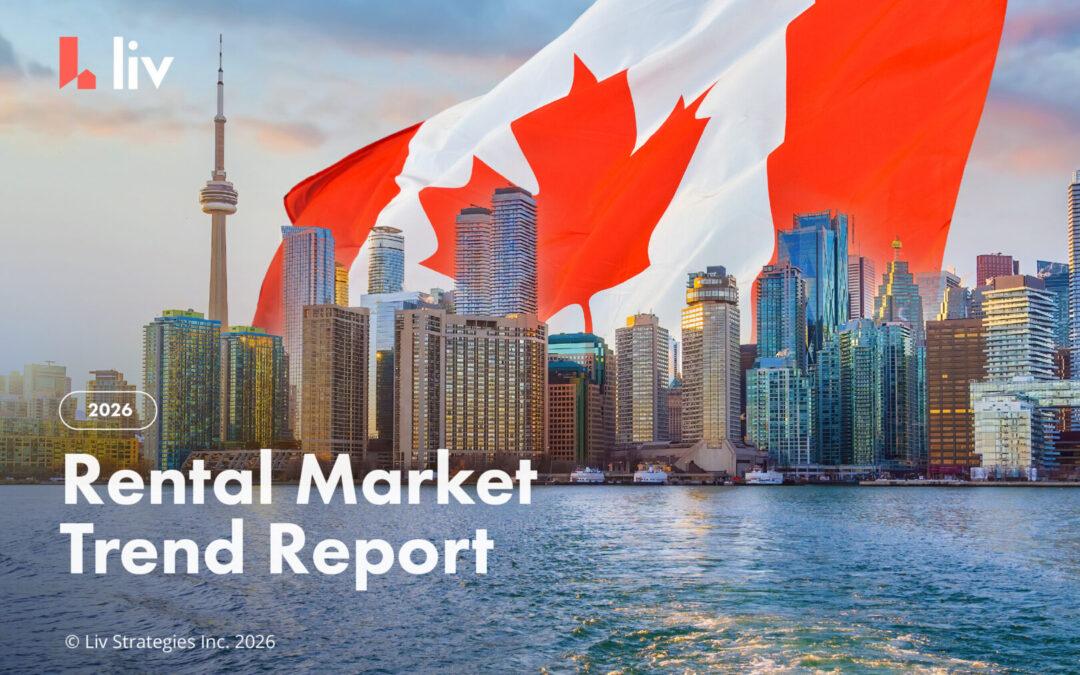
0 Comments